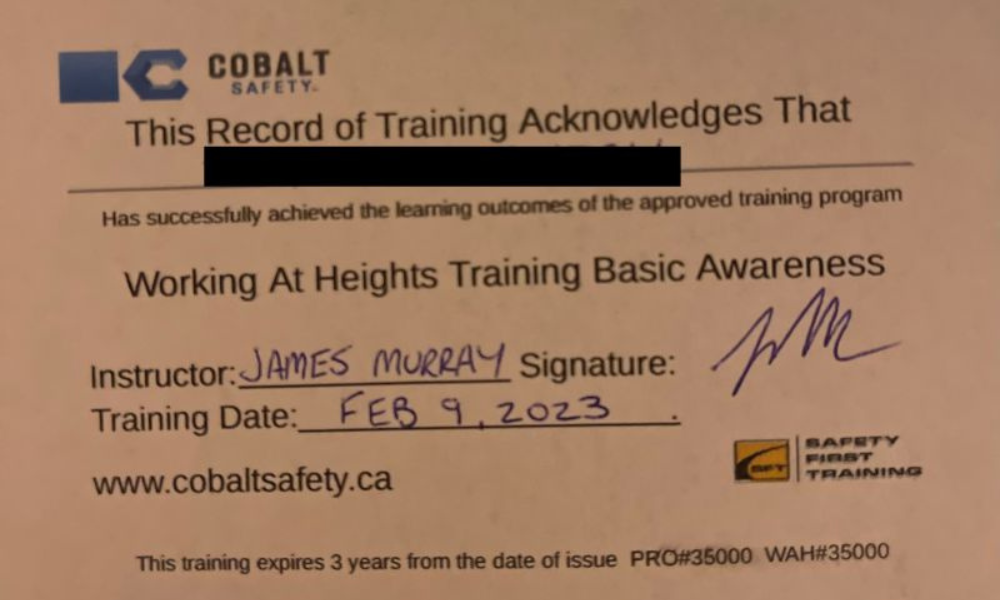How fraudulent documents put workers' lives at risk

An Ontario training provider is sounding the alarm over fake certificates, after someone tried to use his company’s name on a fraudulent working from heights training certificate. “If you're going to put my brand name on a fake certificate, I'm all over you,” warned Kevin Brown, the owner of Cobalt Safety.
Brown posted the fake on LinkedIn with a message to employers as well as safety and compliance professionals. “Fake cards not only mislead individuals and employers, but they also put workers' lives at risk of harm or even death,” reads a portion of the social media post.
Brown was alerted to the fake because an organization did their due diligence to verify the certificate’s legitimacy. They called Brown, “and as soon as I saw it, I told him it was a fraud.”
The business owner says he has deliberately added elements to his certificates which make it difficult to reproduce. He added colour coding to the background, and holograms on the backs of documents. “I've done as much as I can to make them hard to copy,” says Brown.
He isn’t surprised someone is creating fake documents with his brand. In fact, the practice of forging fake certificates has been “going on for years and years throughout the safety industry, not just here in Ontario, but right across Canada,” explains Brown.
In November 2021, the RCMP in Alberta uncovered a large-scale fraud involving the making and selling of counterfeit safety certificates for first-aid training and hydrogen sulphide awareness. Earlier that same year, a Montreal couple was charged with fraud and forging training documents to become a personal care attendant or orderly.
The fakes can sell for hundreds of dollars, making it cheaper than doing the actual training, while also saving potentially hundreds of hours of time spent on courses. But the legal costs far outweigh the benefits.
Read next: Ontario Ministry of Labour accused of spying for tax purposes
In Ontario, it is an offence under the Occupational Health and Safety Act for any person to knowingly provide an inspector with false information, including a fake certificate or training record.
In a statement to Canadian Occupational Safety, Ontario’s Ministry of Labour, Immigration, Training and Skills Development says it investigates all complaints regarding fake documents.
“Providing a false training certificate may result in a ministry inspector taking an enforcement action such as initiating a prosecution against the workplace party who provided the false certificate,” reads the statement. It goes on to say employers can also face penalties for failing to verify the authenticity of a document.
“Depending on the circumstances observed, the employer could be issued a stop work order and/or a ticket under the Provincial Offences Act for failing to ensure that a worker has a valid training certificate.”
Penalties for convictions vary depending depending on which section of the Provincial Offences Act the charges fall under. A conviction under section 3 carries a $1,000 fine. But a conviction under section 23 comes with a max fine of $500,000 and a prison sentence of up to 12 months.
Brown thinks creating and selling fakes should constitute criminal negligence. “The people issuing those cards are really putting somebody else's life in jeopardy.”
Brown spent several years working as an inspector with the Ministry of Labour and came across more than a couple of fake certificates during that time. His advice to employers is straightforward.
“When in doubt, check it out,” says Brown, which means contacting the purported provider, and if it is determined to be fraudulent, report it to the ministry.





